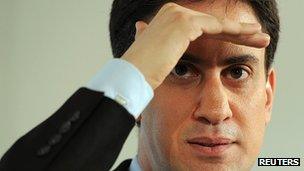Has Ed Miliband mapped out a new direction for Labour?
- Published

The Labour leader is looking to the future
New year, new direction. But not new Labour. That was Ed Miliband's message.
His party would now move beyond the bountiful Blair/Brown era when - for most of it, at least - the economy was expanding, and public spending with it.
The political territory had changed and Labour's task in future would be to champion fairness in a more austere age.
In fact, towards the end of 2011, Mr Miliband had already signalled that - under his leadership - the party would not go in to the next election offering to spend significantly more than the coalition.
Indeed, with the strong possibility that there would still be a deficit to reduce in 2015, cuts would have to be made.
But some of those in Labour's ranks felt that their leader had not been explicit enough in spelling out the "difficult decisions" Labour would have to take if it formed the next government and that the wider public still believed the main party of opposition was against every cut the coalition was implementing.
So Mr Miliband's advisers talked up his speech as a departure from the recent past.
New battleground
The Labour leader himself said he was defining the new battleground in British politics. It would no longer be a fight over how much, or how little, the government should be spending but over how fast - and how fairly - reductions in expenditure could be carried out.
The problem Mr Miliband is attempting to address is one which is also afflicting some other centre-left parties on the continent.
There has been some lively debates within European social democratic parties over how they can convince voters that they can be both socially progressive and fiscally conservative.
They are finding that, in tough times, voters are not turning to them to protect them. While those parties are trusted to spend money, they are not judged as the most competent politicians to save it.
Hence Mr Miliband's message today that Labour was not just a "party for the good times" and was in fact the only party that could be trusted to be fair when making cuts.
But he has several problems in convincing voters that his party is changing, and that he is taking it in a new direction.
The first difficulty is that some polls suggest a significant section of the electorate still want Labour's leadership to acknowledge that it put the economy on the wrong track in the first place.
Neither Mr Miliband nor shadow chancellor Ed Balls believe that. So, they won't apologise for the scale of the deficit which, as they see it , was partly a consequence of - and partly a response to - the international financial crisis.
The most they will concede is that not all the money the last government spent was dispensed wisely, and that the banks were not adequately regulated.
So it remains to be seen if Mr Miliband has yet earned the permission to be heard from sceptical voters.
Political milestones
The second problem for the Labour leader is that voters might well want to see clear milestones on his new political journey, while he would be happier - three years or so before an election - to adopt a rather more vague route.
While the shadow defence secretary Jim Murphy has set out which coalition cuts he would accept, this approach has not been adopted across the board.
His party leader has not outlined what he believes ought to be cut department by department and indeed what specific spending he would protect.
That would be politically quite a risky road for an opposition to go down so far away from polling day, so instead Mr Miliband set out some very small scale symbolic acts in his speech.
For example, he suggested the state might not be able to go on increasing winter fuel allowances and he would transfer responsibility for cutting energy bills to the private sector by putting pressure on the utilities to give older pensioners the best tariffs.
But some of his internal critics will be pushing for rather more significant symbolic shifts in policy to enable their leader's message to "break through" to an electorate that simply is not paying very much attention to Labour's alternative to the government's deficit-reduction plan.
Convincing voters
Perhaps the biggest hurdle Mr Miliband has to overcome is convincing voters that he should be in his party's driving seat at all.
Recent polls suggest dissatisfaction with his leadership.
His - now very unofficial - adviser Lord Glasman said last week he had had "flickered rather than shone" and former home secretary Alan Johnson talked of a "shaky start" to the year.
On 91╚╚▒Č Radio 4's Today programme Mr Miliband seemed to be suggesting it would all have been worse if his brother - or indeed someone else - had been elected as Labour leader because they would have been less willing to break with the party's past.
But he still has an uphill struggle to convince the wider electorate that he represents Labour's future.
- Published10 January 2012
- Published7 January 2012
- Published4 January 2012